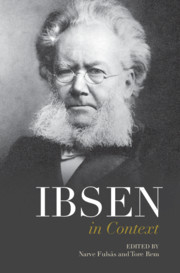Book contents
- Ibsen in Context
- Ibsen in Context
- Copyright page
- Contents
- Figures
- Contributors
- Preface
- Notes on the text
- Chronology
- Part I Life and Career
- Part II Culture and Society
- Chapter 4 Genres
- Chapter 5 Realism
- Chapter 6 Theatre
- Chapter 7 Visual Arts
- Chapter 8 Music
- Chapter 9 Philosophy
- Chapter 10 Science
- Chapter 11 Feminism
- Chapter 12 Capitalism
- Part III Scandinavian Reception
- Part IV Internationalization
- Part V Afterlives
- Further Reading
- Index
Chapter 11 - Feminism
from Part II - Culture and Society
Published online by Cambridge University Press: 23 April 2021
- Ibsen in Context
- Ibsen in Context
- Copyright page
- Contents
- Figures
- Contributors
- Preface
- Notes on the text
- Chronology
- Part I Life and Career
- Part II Culture and Society
- Chapter 4 Genres
- Chapter 5 Realism
- Chapter 6 Theatre
- Chapter 7 Visual Arts
- Chapter 8 Music
- Chapter 9 Philosophy
- Chapter 10 Science
- Chapter 11 Feminism
- Chapter 12 Capitalism
- Part III Scandinavian Reception
- Part IV Internationalization
- Part V Afterlives
- Further Reading
- Index
Summary
Ibsen’s plays have always been taken to speak directly to feminist concerns. Socialists and feminists from Eleanor Marx Aveling to Lu Xun and Simone de Beauvoir have praised A Doll’s House as a feminist breakthrough. That play shocked because Ibsen showed that marriage and family – women’s so-called ‘natural destiny’ – might not by themselves satisfy a woman’s desire for a morally responsible life.
But was Ibsen himself a feminist? This chapter examines his famous speech from 1898 in which he appears to deny that he ever supported the ‘cause of women’, and brings out its politics by comparing it to his equally famous speech in 1885 expressing his trust that women and the working class would bring about social change.
Turning to feminist theory, the essay discusses the conflict between ‘universalist’ and ‘differentialist’ readings of Ibsen’s heroines. Must we choose between considering Nora as a human being and considering her as a woman? Or between reading Hedda Gabler as a play about modernity or a play about femininity? Drawing on the philosophy of Simone de Beauvoir, the chapter shows that Ibsen’s plays rehearsed these questions long before they became crucial to contemporary feminist debates.
- Type
- Chapter
- Information
- Ibsen in Context , pp. 91 - 98Publisher: Cambridge University PressPrint publication year: 2021
- 1
- Cited by

